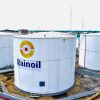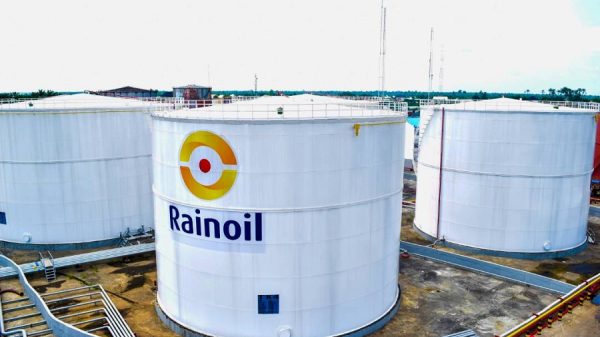Claim
Recently, several social media posts and viral videos claimed that some Nigerians are now using palm oil as a lubricant for car and motorcycle engines.

The background
Some social media users have suggested the use of palm oil as a lubricant for engines. In the posts, images and videos of some Nigerians allegedly putting palm oil in motorcycle and car engines Nigerians. They claimed that inflation in the price of engine oil was the reason why Nigerians are resulting in using the product as lubricant.
On the other hand, some aviation stakeholders have also called on the Nigerian government to approve the use of palm oil as aviation fuel in the country.
In October, Daily Trust reported that aviation stakeholders said Nigeria is ripe enough to find alternatives for aviation fuel considering the high cost of importation.

They made the call at a consultative meeting on the development and deployment of Sustainable Aviation Fuel (SAF), Low Carbon Available Fuel (LCAF) and other cleaner fuels in Nigeria.
Capt. Roland Iyayi who spoke on behalf of the Airline Operators of Nigeria (AON) noted that the country currently stands a better chance to drive alternative fuel for the aviation sector through the exploration of palm oil.
According to the operators, the time has come for Nigeria to explore alternatives for aviation fuel following the inflation in the price of Jet A1 which was selling for N1,000 per litre at the time.
“Airline operators have quietly been following developments in the sector, especially conversations on sustainable aviation fuel and it is a huge opportunity for Nigeria because the major component for sustainable aviation fuel is palm oil,” Iyayi said.
“The technology is currently being developed at a very high rate in the UK and Nigeria has a comparative advantage because we already have the raw materials in abundance.
He noted that aviation fuel constitutes 40 per cent operating cost for every airline and with the product at 1,000 per litre, it is no longer sustainable.
“If the NNPC champions sustainable aviation fuel using palm oil, it will give Nigeria a comparative advantage and the bigger picture is that the economy will grow and it will remove import dependency and create jobs. So, for the airline operators, we say there is a technology available and there is raw material available so we can use that as an advantage to lead the world in alternative aviation fuel,”
Also speaking at the meeting was the minister of aviation and aerospace development, Festus Keyamo who said, “The collaboration is the only way to facilitate the development and deployment of aviation cleaner energies in Nigeria and ensure that the country is not left behind in aviation environmental protection initiatives.
“A number of technical analyses done revealed that Sustainable Aviation Fuel (SAF) has the greatest potential to reduce CO2 emissions from International Aviation. This further underscores the importance of this consultative meeting to aviation. The step that is being taken here today shows our commitment to meeting Nigeria’s pledge under the Paris Agreement, the Nationally Determined Contributions (NDCs) and the United Nations Sustainable Development Goals (SDGs),” Keyamo said.
Verification
DailyAgent Check interviewed an energy expert, Alamin Kamaldeen with more than a decade of experience having worked with Sahara Energy Group in the downstream sector and E-Sam Energy Ltd in the renewable sector.
Kamaldeen said palm oil is an edible vegetable oil derived from the fruit of the oil palm and was the predominant source of lubrication along animal fat before the discovery of mineral oil in the 1800s.
On-engine lubricant, he said is a substance used for lubrication of an internal combustion engine typically consisting of a base oil enhanced or infused with various additives like anti-wear, detergents, and dispersants and tends to have varying viscosities measured using the Viscosity Index (VI) NB: the lower the VI (80 to 120 F), the more the viscosity is affected by changes in temperature.
He added that their main function, however, is to reduce the friction, wear and clean sludge within moving parts in the engine (pistons)
“Every lubricant starts with a base oil which makes about 90% of the oil composition while additives make up about 10%. These base oils could be mineral (crude oil origin), vegetable (bio lubricant) or synthesized base stock. They could also be a blend between two base oils for example mineral and vegetable blend,” he said.
“The advantages of the vegetable base stock oil are that it tends to have better biodegradable properties and the blended formulate tends to have better VI, flash point and evaporative loss.
“The disadvantage is that compared to mineral oil, it tends to have foaming characteristics and sulphate ash which are bad for an engine long term and may cause poor fuel economy.”
Speaking on whether palm oil can be used as aviation fuel (Biojet Technology), the energy expert said it is possible but not exclusively.
“Yes, but not exclusively. It has been in use for over a decade in the aviation industry. However, the oil has to be refined to remove impurities, and traces of water and also be blended with Jet A1.
“The end product is known as Sustainable Aviation Fuel (SAF). As the aviation industry contributes 2-3% of the effects of climate change.”
He said SAF has the potential advantage in:
- use oils from the household that can be collected and recycled to make SAF
- it could potentially reduce GHG emissions by up to 75% over the lifecycle
- it can work with conventional engines
- there is no need to alter the current infrastructure
- reduces air pollution and contributes to having cleaner air
He added that the disadvantage of SAF is its high cost compared to fossil-based jet fuel which has said it be about 2 to 8 times more expensive depending on the conversion technique; the high cost of feedstock; and competition with biodiesels for feedstock and production.
Kamaldeen noted that there are limited financial incentives and policies that support the push for SAF in the country.
Searching for further facts on the subject, DailyAgent Check found that Indonesia had conducted its first commercial flight using palm oil-blended jet fuel in October 2023, according to Reuters.
These findings have established that palm oil can be used as a lubricant for engines as well as aviation fuel but not in its raw form (normal palm oil).
Using Google Scholar search, DailyAgent Check found a research article titled: “Experimental Investigation on Usage of Palm Oil as a Lubricant to Substitute Mineral Oil in CI Engines” by K.S.V. Krishna Reddy, Naval Kabra, UmeshKunchum, and T.Vijayakumar established that “Palm oil provides more potential for successful utilization as a base for lubricant oil”.
The research investigates the usability of palm oil (25% and 50% blend with mineral oil SAE20W40) as a base in the formulation of an environmentally friendly lubricant for 4-stroke diesel engines and to study the variation in the performance and emission characteristics of the diesel engine due to the blended lubricants at different load conditions.
The research article was published by Hindawi Publishing Corporation, Chinese Journal of Engineering Volume 2014, Article ID 643521, 5 pages; the engine used for the investigation includes a Kirloskar, AV1, single-cylinder, 4-stroke, water-cooled, high-speed diesel engine.
“The formulated blends of palm oil show similar properties compared to commercial SAE 20W40 oil in terms of mechanical efficiency, brake thermal efficiency, and brake-specific fuel consumption (BSFC).
“The engine performance and fuel consumption for both lubricants showed no appreciable difference either. The study revealed that by using blends of 25% palm oil the NO𝑥 emission levels are reduced as compared to mineral oil.
“Also, the palm oil-based lubricant is derived from a renewable and lower carbon source; this blended formulation could potentially be considered a good alternative to mineral oil-based lubricants. Since the cost of palm oil-based lubricating oil is much lower than the SAE 20W40 mineral oil,” the research concludes.
Verdict
Based on our findings, the use of palm oil as a lubricant and aviation fuel is HALF TRUE—This is because the claim was found to be partially inaccurate but contains some element of truth.













alayd
May 18, 2024 at 4:25 am
Wow Thanks for this information i find it hard to stumble on really good advice out there when it comes to this material thank for the content site
Athena666
August 26, 2024 at 5:44 am
Wow Thanks for this post i find it hard to obtain excellent data out there when it comes to this content thank for the site website
Athena666
August 26, 2024 at 7:21 am
Wow Thanks for this site i find it hard to discover smart material out there when it comes to this subject matter thank for the content website